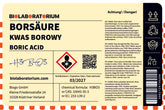Iodine is a fascinating chemical element that plays an important role in a variety of industrial and analytical applications. As one of the heavier halogens, iodine possesses unique physical and chemical properties that make it a valuable tool in modern chemistry and industry.
The extraction and properties of iodine
Elemental iodine is mainly obtained from brine, seaweed, or minerals. Through oxidation and distillation, iodine can be isolated in pure form. In appearance, it resembles shiny, blue-violet crystals that have a characteristic odor. Iodine is solid at room temperature but sublimates easily, forming violet vapors.
Chemically, iodine is a very reactive element. It can form compounds with many other elements and acts both as an oxidizing agent and as a reducing agent, depending on the reaction conditions. This versatility makes iodine a valuable tool in organic synthesis, analytics, and industrial processes.
Applications of iodine in industry
One of the main application areas of iodine is the production of dyes and pigments. Iodine-based compounds such as iodides and iodides are used in the textile, paper, and plastics industries. Furthermore, iodine plays an important role in the production of photographic chemicals, disinfectants, and pharmaceuticals.
In the electronics industry, iodine is used as an alloy component in semiconductor materials. It is also applied in lighting devices, surge protection devices, and high-voltage cables.
Another important application area of iodine is water treatment. Iodine-containing compounds are used for the disinfection and sterilization of drinking water. Iodine compounds are also used in wastewater treatment and cooling systems.
Iodine in chemical laboratories
In chemical laboratories, iodine is an indispensable reagent for a variety of analyses and syntheses. Due to its oxidizing and complex-forming properties, it is used in qualitative and quantitative analysis. For example, iodine can be used to detect starch, proteins, or unsaturated compounds.
Moreover, iodine plays an important role in organic synthesis. It serves as a catalyst, oxidizing agent, or halogenation reagent in many chemical reactions. Iodine compounds such as iodine monochloride or iodine trichloride are frequently used in laboratories.
The future of iodine in industry and research
Given the diverse applications of iodine, it can be assumed that this element will continue to play an important role in industry and research in the future. New developments in areas such as electronics, energy technology, and environmental technology could further increase the demand for iodine.
Furthermore, new application fields for iodine may open up, such as in medical technology or catalysis research. The study of the properties and reactivity of iodine therefore remains an exciting topic for chemists and engineers.
Overall, it is evident that iodine is a versatile and indispensable element in modern industry and research. Its unique properties make it a valuable tool in a variety of applications - from dye manufacturing to water treatment. The future of iodine in chemistry and industry therefore promises to remain exciting and innovative.









































